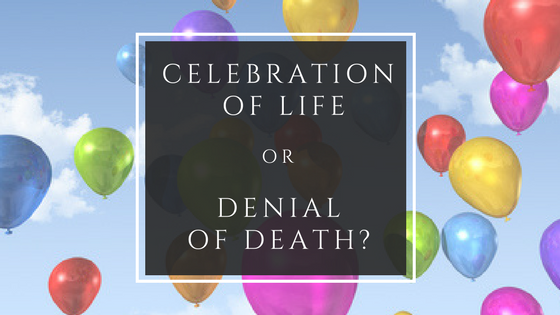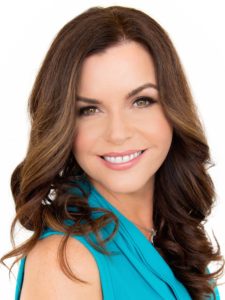
People are often surprised when they learn of my love-hate relationship with the term “Celebration of Life.”
“But you’re a Celebrant!” they say. “Doesn’t that mean you like to celebrate?”
Well, yes…and no. It depends.
Let’s take a look at Google’s definition of the word:

Call me a killjoy, but I’m not a huge fan of the “happy funeral” trend. I’m also concerned that the term “Celebration of Life” puts unnecessary pressure on a family to “make it fun.” I hear it all the time: “We don’t want people to feel sad.” But sad is what we are supposed to feel when someone we care about dies. To deny ourselves that safe space to feel sadness is to deny and diminish the value and purpose that funerals offer us as human beings.
When a “Celebration of Life” is rooted in relevant and meaningful ceremony, I’m all in. But when a “Celebration of Life” is essentially a party that downplays the reality that someone has died, I question the benefit of that experience in the context of grief.
You may want a party. But you may need a funeral.
And when it comes to funerals, there are no rules. A good, authentic funeral can be modern or traditional, uplifting or solemn, casual or formal. It can have elements of lightness and laughter. But the primary goal should not be to put the “fun” in funeral. The purpose should not be solely to make people feel happy.
Our society’s cultural obsession with the pursuit of happiness has rendered many people unwilling or incapable of dealing with painful life experiences, especially death. But happiness is only one of many emotional states. To embrace the human experience means embracing the full spectrum of human emotions—even the ones that don’t bring us pleasure.
Recently, my husband opened up about the grief he has been suppressing since the death of his mother last year. “I don’t know what’s wrong with me,” he confessed. “I just feel so sad.” It upset me deeply to learn that he had been suffering in silence, but also that he actually thought something was wrong with him because he felt sad. The relief on his face was visible when I suggested that there was nothing wrong and everything right with how he was feeling. His mother, with whom he was extremely close, had died. Of course he’s been sad.
Sadness is not a disease we need to cure. It’s a feeling we need to feel.
There is, of course, a difference between the normal experience of sadness that accompanies grief and a diagnosis of depression, and natural grief can sometimes turn into something more serious if you find you can’t shake your dark thoughts. In either case—whether you are experiencing situational grief or chronic depression—talking to a professional may help you navigate your unfamiliar feelings.
But my darkest moments have provided me with my greatest opportunities for growth and reflection. They have taught me empathy and compassion. And, while they are moments I sometimes find difficult to reflect upon, I am grateful that I lived through them. They have strengthened and stretched me, and illuminated what is really important.
For me, the feeling of contentment and aliveness is most prevalent during moments of deep connection with other human beings. Perhaps this is why I am so passionate about ceremonies—even (and especially) funeral ceremonies. Because good funerals provide a safe space for all emotions to be acknowledged and expressed. Good funeral ceremonies not only help people begin to accept the death of someone they love, but also foster connection through a transformational shared experience remembered by all in attendance.
Maybe the key to happiness is not in merely being happy but rather in feeling whole. As the poet Rumi said, “The wound is the place where the light enters you.”
So go to a funeral and celebrate a life. But don’t forget to also mourn a death.
That’s how the light gets in.
* * *
 AUTHOR: LINDA STUART
AUTHOR: LINDA STUART
Linda Stuart is a Life-Cycle Celebrant/Officiant and Speaker located in Toronto, Ontario. Specializing in funerals and weddings, Linda’s passion is bringing stories to life through meaningful ceremonies.
You may also like: When Dust in the Wind Isn’t Enough | When I Die, Please Do Something | Stella Joy: Celebrating her Small but Mighty Life

I agree with your reflection on our culture avoiding the sorrow and loss that people feel when a death occurs. The definition above refers to pleasure which is not usually present upon a death.
Joanne Cacciatore, PhD writes beautifully about it in “Bearing the Unbearable”. She speaks of finding a home for our emotions and a Celebration of Life/Funeral/Memorial can do just that. Jeffrey Rubin writes in the Foreword to her book: ..as reminded by psychoanalyst Robert Stolorow… “Grief that is dismissed, suppressed, or silenced harms individuals, families, and communities.” A good Celebration of Life/Funeral/Memorial does the opposite of suppressing…it brings those emotions to the surface and honours them.
Thank you for your thoughtful comments Patti. I agree that ceremonies can help give our feelings “a place to go. ” I also enjoy Elizabeth Gilbert’s explanation of why we need ceremonies:
“We do spiritual ceremonies as human beings in order to create a safe resting place for our most complicated feelings of joy or trauma, so that we don’t have to haul those feelings around with us forever, weighing us down. We all need such places of ritual safekeeping.”
Thank you for writing this, Linda. There is so much emphasis today on “closure” that we tend to close things before they have been opened fully. Sadness is not synonymous with grief, and grief is not one size fits all. We need to grieve without the pressure of “getting over it”.
Thank you for your comments Lorraine. It’s funny, I also really don’t like the term “closure” in the context of funerals either. To me, a good funeral is about opening, not closing!
I’m with you, Linda! I’ve shared your thoughtful and important post on several of my Facebook pages. Thanks for being willing to take on the current conventional wisdom.
Thank you Holly! I am honoured as I’m such a fan and always in awe of the amazing you work you do around death, dying and funerals 🙂
Linda
Well said
I am 57 years old
The finest man I have ever known
My grandfather died
Tragically and far too soon
For various reasons
I was not involved or present
At his funeral
I won’t bore you with the
Examples of dysfunctional reasons
I became an angry young man
At 22 years old
I entered addiction recovery
I stayed clean and sober
For 28 years happily and productive
Tragedy and death visited again
Within months
My recovery was in serious relapse
A seven month drunk
I lost everything and almost my life
I am pleased to say
I am clean and sober 16 months
Working painfully
With lifetime anxiety and depression
Often times hidden
From everybody
Fifty years of grief
Stored up
Waiting to pounce
Today I am a total new man
Hundreds of fellow concurrents
And believe me
90% are deeply deeply
Sick with grief
When a professional
Suggested unprocessed grief
Was the ROOT of all my issues
I thought she was crazy
It was half a century ago
I started listening to my
Peers in recovery
Grief here Grief there
Grief unprocessed everywhere
I almost drank myself to death
I damaged my family
I lost all treasure
Because
Gramps was with God
You will see him again
Big boys don’t cry
Don’t make Grams sad
Time to move on
Let the dead bury the dead
I wander Toronto
Seeing such sadness
I suspect
Like me and my peers
People have lost loved ones
And not allowed to grieve their loss
Or confront their mortality
Or weep at the temporary unfairness
Linda
Thank you for sharing
Your courage and strength
Funerals aren’t fun
They are therapy
I remember learning about funerals. I was never impressed with the concept of standing around with others and grieving in public.
Then I learned about the Irish Wake as a celebration of a person’s life, as a sendoff and an opportunity to grieve and I was much more impressed.
Later in life, I have learned about the celebration of life, celebrants with alternative ceremonies and find this a much more universal way to help people move on. It’s about allowing them to grieve and celebrating the life of the departed.
https://lossgriefhope.com/problem-funeral-going-party/ jason troyer, similar feelings
Hi Linda..i agree with you..i lost my sister a year ago on the 24th of Nov..now our family will be put to the test again as my brother is ill with cancer..i have allready lost one brother to this horrible disease. It breaks my heart as you say no one can grieve ..because they have the celebration of life and its suppose to be fun and closure..i disagree.
We need to have a funeral for closure..when its a celebration of life i feel that person has gone away..
As a celebrant in the UK I share your views. I am struck by how often families reject a piece of music that meant something to the deceased person saying “ Oh no, we can’t have that. It might make people cry.”
Also there is an increasing trend for families to want the coffin to remain in view rather than be lowered or disappear in any way. This is more understandable when they want to file past or touch it, leave a flower or have their own personal moment of goodbye. But often it is again because it’s “ unbearable” to see it go. Again, a refusal to come to terms with the real loss of the person.
I don’t think that anyone has the right to judge how others grieve or mourn. I lost my husband to a very aggressive type of liver cancer. He was 61 years old and lived only nine weeks from diagnosis. There is no closure for his death – it is not something I will “get over” – it is something I will get through.
Celebrating the life of someone who has died is not about those left behind. It is about sharing the value and importance of the life of the person who has died and saying it is okay to talk about them, to keep their memory alive, to remember the good times. I do not want people to look the other way when they see me because they do not know what to say, or not talk about him in my presence because they think it brings me pain. I do not want his memory erased from my life.
A Celebration of Life is not about “fun.” It is about honoring a life instead of just remembering a death.
Thank you Linda for voicing my own thoughts and concerns.
I have just attended a funeral where the celebrant 5 times informed the attendees that they were not to grieve or mourn as the deceased would not want them to do so.
Grieving is a healthy way of processing the loss of someone who is loved, so to deny that emotion is not healthy nor advisable.
I have seen the damage caused by repressed or unresolved grief and thus, I have concerns over the manner in which people are being encouraged to deny their feelings.
It is reassuring to know that there are others like yourself who are as passionate about this situation as myself.